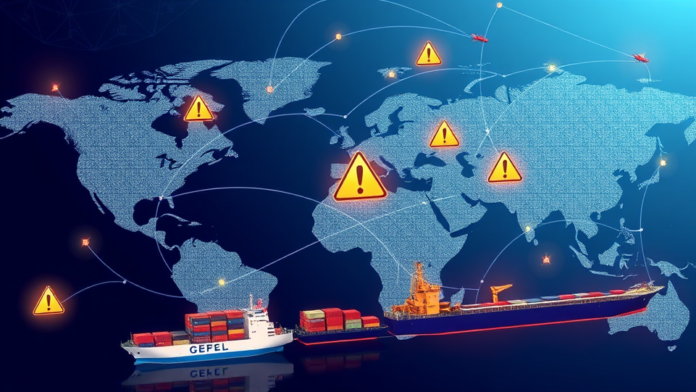Introduction to Global Supply Chain Disruptions
Definition and Overview
Global supply chain disruptions have become increasingly prevalent, impacting various industries and economies worldwide. These interruptions can stem from geopolitical tensions, natural disasters, or pandemics, leading to significant delays and increased costs. Understanding these dynamics is crucial for businesses aiming to mitigate risks. Supply chain resilience is essential for maintaining operational efficiency. It’s vital to adapt strategies accordingly. The financial implications can be profound, affecting cash flow and profitability. Companies must prioritize risk assessment and management. This is a critical step. The interconnectedness of global markets amplifies these challenges. Are we prepared for the next disruption?
Historical Context and Recent Events
Historically, global supply chains have evolved through advancements in technology and trade agreements. These developments have facilitated increased interdependence among nations. However, recent events, such as the COVID-19 pandemic, have exposed vulnerabilities within these systems. Disruptions in production and transportation have led to significant delays. This has affected various sectors, from manufacturing to retail. The reliance on just-in-time inventory practices has further exacerbated these issues. Companies are now reevaluating their strategies. It’s a necessary step. Additionally, geopolitical tensions have introduced further uncertainty. Are businesses ready to adapt? Understanding these factors is crucial for future resilience.
Causes of Supply Chain Disruptions
Natural Disasters and Pandemics
Natural disasters and pandemics significantly disrupt supply chains, leading to financial instability. These events can halt production and delay shipments, creating a ripple effect across industries. For instance, hurricanes can damage infrastructure, while pandemics can restrict workforce availability. This results in increased operational costs and reduced efficiency. Companies often face inventory shortages as a consequence. It’s a pressing issue. Furthermore, the unpredictability of such events complicates risk management strategies. Businesses must adapt to these challenges. Are they prepared for future disruptions? Understanding these causes is essential for developing robust contingency plans.
Geopolitical Tensions and Trade Policies
Geopolitical tensions and trade policies are critical factors influencing supply chain disruptions. These tensions can lead to tariffs, sanctions, and swap barriers, which complicate international trade. For example, a sudden increase in tariffs can raise costs for businesses. This often results in higher prices for consumers. Companies must navigate these complexities carefully. It’s a challenging landscape. Additionally, political instability in key regions can disrupt logistics and transportation routes. This unpredictability can hinder timely deliveries. Are businesses equipped to handle these changes? Understanding the implications of geopolitical dynamics is essential for strategic planning.
Impacts on Businesses
Operational Challenges and Costs
Operational challenges significantly impact businesses, leading to increased costs and inefficiencies. Key issues include:
These factors can strain financial resources. Companies often face reduced profit margins as a result. It’s a concerning trend. Additionally, the need for contingency planning adds to operational expenses. Businesses must invest in risk management strategies. This is a necessary investment. Understanding these challenges is crucial for maintaining competitiveness. Are companies prepared to adapt?
Effects on Customer Satisfaction and Loyalty
Supply chain disruptions can significantly affect customer satisfaction and loyalty. When products are delayed or unavailable, customers may seek alternatives. This shift can lead to a loss of market share for businesses. It’s a critical concern. Additionally, inconsistent product quality due to rushed production can damage brand reputation. Companies must prioritize maintaining standards. This is essential for trust. Furthermore, increased prices resulting from supply chain issues can frustrate consumers. They may perceive the brand as less valuable. Understanding these dynamics is vital for strategic planning. Are businesses ready to enhance customer experience?
Strategies for Mitigating Disruptions
Diversification of Suppliers
Diversification of suppliers is a crucial strategy for mitigating disruptions. By sourcing from multiple suppliers, businesses can reduce dependency on a single source. This approach enhances resilience against supply chain shocks. It’s a smart move. Additionally, companies can negotiate better terms and prices when they have options. This can lead to cost savings. Furthermore, diversifying suppliers across different regions can minimize risks associated with geopolitical tensions. It’s essential for stability. Companies must assess their supply chain regularly. Are they prepared for potential disruptions? Understanding these strategies is vital for long-term success.
Investment in Technology and Automation
Investment in technology and automation is essential for mitigating supply chain disruptions. By implementing advanced systems, businesses can enhance operational efficiency. This leads to faster response times and reduced errors. It’s a significant advantage. Key technologies include:
These innovations can lower operational costs and improve inventory management. Companies can adapt more quickly to changes. This is crucial for competitiveness. Additionally, automation can alleviate labor shortages by increasing productivity. Are businesses leveraging technology effectively? Understanding these strategies is vital for resilience.
Future Outlook and Trends
Emerging Supply Chain Models
Emerging supply chain models are reshaping the future landscape of logistics and distribution. These models emphasize flexibility and responsiveness to market changes. For instance, the adoption of decentralized supply chains allows for localized production. This can reduce lead times and transportation costs. It’s a strategic advantage. Additionally, the integration of digital platforms enhances collaboration among stakeholders. This fosters real-time data sharing and decision-making. Companies are increasingly focusing on sustainability as well. This is a growing trend. By adopting circular economy principles, businesses can minimize waste and improve resource efficiency. Are organizations ready to embrace these changes? Understanding these trends is essential for future success.
Role of Sustainability in Supply Chain Management
Sustainability plays a crucial role in supply chain management, influencing future trends and practices. Companies are increasingly adopting sustainable practices to enhance their brand reputation. This can lead to customer loyalty. Key strategies include:
These efforts not only benefit the environment but also improve operational efficiency. It’s a win-win situation. Furthermore, regulatory pressures are driving businesses to prioritize sustainability. This is becoming a necessity. Investors are also favoring companies with strong sustainability commitments. Are businesses prepared for this shift? Understanding the importance of sustainability is essential for long-term viability.

